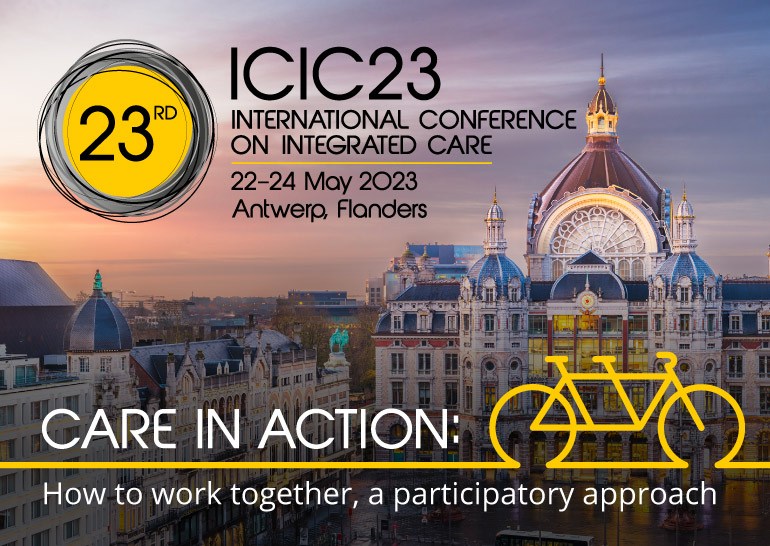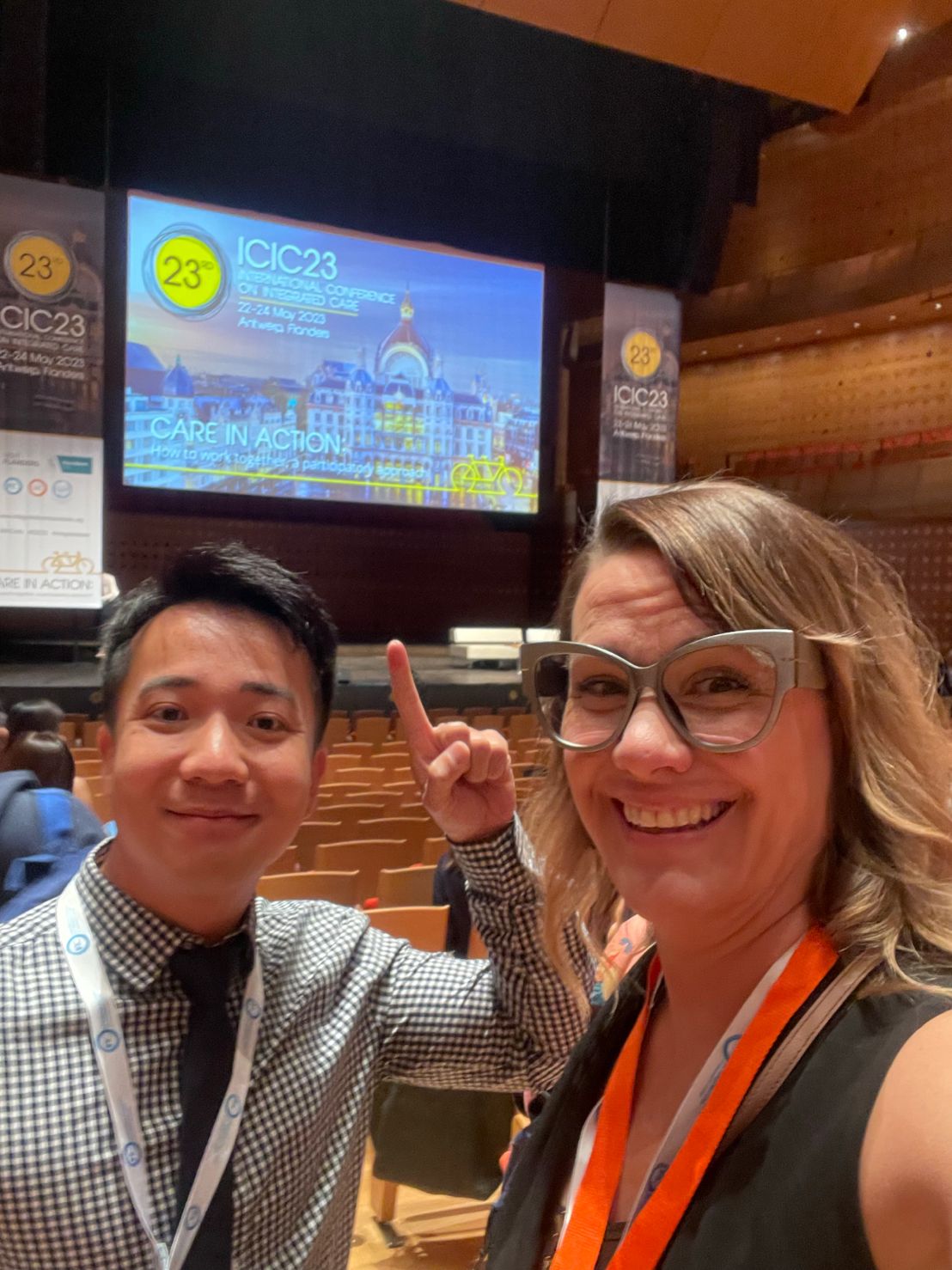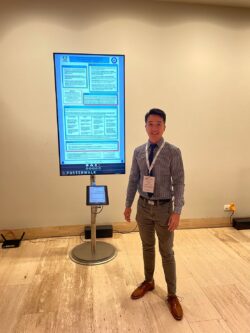

Dr. Cara English and DBH Candidate, William Chum at ICIC23
When I return to my “normal” schedule after attending an International Conference on Integrated Care (ICIC), I find it difficult to share the experience in words. My mind conjures images of the incredible people, places, and stories that come together for three days during these events, giving every attendee a memory book of knowledge and experiences that truly change the professional you were into someone new. There is so much energy, enthusiasm, passion, and support thrumming through these events; it’s enough to fuel any provider for weeks following the events. At the same time, you know it will be a year or more before you see international colleagues again, and you experience a bit of grief at the loss of them in your daily life. ICIC events breathe life back into the work, even for those who are quite passionate enough on their own. We easily get bogged down in the day-to-day tasks with our heads down. Being at an ICIC event is akin to flying high above, seeing the fuller picture – fuller than you’ve ever seen it before, so that your understanding is more complete and your determination to keep going is renewed.
ICIC23 was held in Antwerp, Flanders, the northern part of Belgium bordering the Netherlands and Germany; a primarily Dutch-speaking region roughly the size of Connecticut in the US. One of the many benefits of attending ICIC events is visiting places you’ve never been and learning about the local healthcare challenges that providers are working to solve. Having served on the ICIC Scientific Committee for a few years now, I have had the opportunity to preview some of the topics that will be discussed in presentations. Seeing these presentations in person, hearing the contextual anecdotes that accompany abstracts, and having the opportunity to discuss work further with speakers is a wonderful learning experience.
Typically, there are a large number of presentations coming from the region where the event is held, and that was true for Belgium and for Flanders, in particular. I learned about how health care is structured and funded in this region, as well as some of the unique challenges that are being addressed in design and delivery. As you can imagine, despite massive differences in payment structure in countries with national healthcare services, many of the problems that patients and caregivers face are not unique to Flanders. Listening to the stories of patients and caregivers from Flanders and other parts of the world, I heard once again how we continue to miss the mark in making care “patient-centered,” despite our best attempts to include patients and their families in the design and delivery of care pathways.
One attendee shared her frustration as a patient in a session I attended. She pointed out that the conference was being held next door to the Antwerp Zoo, and that attending the sessions felt a little like being “put in the zoo” as a patient. Leaders, clinicians, managers – all attending to put the patient back at the center of care, and yet, it still felt to this attendee that we were still isolating ourselves from the true patient lived experience. That metaphor sticks with me because in reflecting on integration efforts as a human – not a clinician, leader, manager, etc. – it’s clear to me where we’re falling short. But how do we bridge the gaps with our unwieldy systems of care?
Another attendee in that same session remarked that as a researcher, it occurred to her that we were trying to solve the problems inherent in our systems using the same thinking that created the problems to begin with; that it felt as though we were trying to play a strategic and logical game of chess when what we really needed to realize is that we are playing the wrong game, entirely.
As a psychology-minded provider, metaphors hit differently with me. These two shared metaphors really got me thinking, and I haven’t stopped since having that discussion that day. This is what I love about ICIC events. True inter-professional discussions, diverse perspectives that you do not normally get to have in day-to-day work, and a reminder why all of this is so important and must be built into the new systems we’re all working towards.

Dr. Cara English and DBH Candidate, William Chum at ICIC23
Truly, I could share takeaways from ICIC23 for days – months, even. To save your eyes, I’ll wrap this reflection up with something I feel is truly remarkable about these events: the IFIC team. Despite the mad chaos that goes with getting 1300+ people to hundreds of sessions – both live and virtual – in three days’ time, I have never felt more welcomed and special at a conference than I do when I’m at an IFIC event. The friendliness and inclusion that this team of incredibly knowledgeable and hard-working individuals shares with each person who approaches speaks volumes about the heart behind the mission. They make IFIC feel like home, and they make you feel that you belong, even if it is your first time. It was wonderful to have a CGI student attending this year, and we talked about this after being invited to sit with the IFIC team at networking events and dinners. Having traveled so far to attend this event, being welcomed in this way was certainly the cherry on top of an incredible professional and personal opportunity.
Everyone – especially those in the CGI community – should look into attending an IFIC event. The upcoming Asia Pacific Conference on Integrated Care will in Sydney, Australia will be held November 13-15, 2023. Abstracts for posters and presentations are open until June 23, 2023.

DBH Candidate, William Chum with his Poster at ICIC23
CGI Students:
SUBMIT YOUR ABSTRACTS. Posters are displayed digitally, and there is truly no excuse not to submit if you’ve taken the Psychopharmacology course as you had to prepare a poster in that class as an assignment! There is no cost to submit, and we offer assistance through the Writing Center or by simply asking for feedback and assistance from your instructors. All abstracts from accepted posters are published at no cost to the author in the International Journal of Integrated Care. Want an example? Here’s the first abstract I submitted. Contact me for more information and abstract support.






























